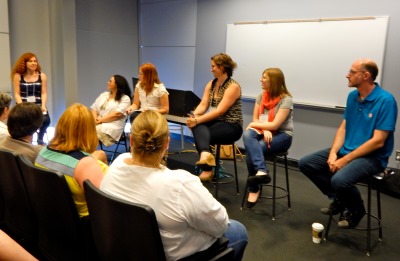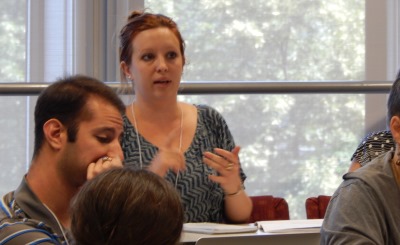04.08.14
Griffin Studio artist Jennifer Medway recently traveled to America to attend the Literary Managers and Dramaturgs of the Americas conference in Boston. She takes a moment to reflect on what she learned and tells us why dramaturgs are ‘artists’ in their own right.
What is a dramaturg? What is dramaturgy? These are probably the most encountered questions for dramaturges, students of theatre and anyone who hears or sees the word at all. Often, hearing the word is met with “ha, ha, sounds like…” and we all know what it’s a letter away from being. The response is varied, people feel confident defining it but usually only for themselves. It seems to often be an individual practice and methodology and no one can agree on it. There isn’t even consensus as to whether it should be written with an ‘e’ at the end or whether we proudly elongate the vowels in “drama” or switch to the British “dramma”.
 |
|
A conference workshop Photo by Cindy SoRelle |
As part of my Griffin Studio place this year I was able to undertake a professional development opportunity by attending the Literary Managers and Dramaturgs of the Americas conference in Boston. Not only was this fantastic to feel a sense of community with our American colleagues but also to get some sound practical advice and feel inspired to keep practicing and defining myself as a dramaturg. I wanted to pass on some of the most useful things I learnt and thought at the conference and genuinely ask some questions:
1. Yes, dramaturgs/es are artists and can feel confident calling themselves artists (regardless of who will know what the word means)
2. Don’t ask to be defined, just say: this is who I am and this is what it’s worth.
3. The wonderful Mark Bly said: we forget that we’re here because we don’t know what it is to be human. Don’t show off what you know because that means you’re not in the room to discover something. Go into a rehearsal room to discover and ask questions. It’s okay to say “I don’t know”- that’s what you’re going to try find out.
4. Dramaturgs can be in leadership positions. Dramaturgs don’t have to be Literary Managers to be in leadership roles and can define their roles in a company as Dramaturgs and not Literary Managers (if that’s their preference!)
5. Listen until your ears bleed and then you can ask the right questions (Mark Bly, again).
6. Let’s talk about alternative forms of dramaturgy. How does dramaturgy work for projects that aren’t text based or don’t come from an Anglo tradition?
7. Let’s keep talking about diversity and inclusion but let’s not stop at colour blind casting. Which roles are in control of representation? Let’s start talking about more diverse directors, writers, dramaturges and artistic directors in our community.
8. In America there is a sense of division between academic dramaturges and practice-based dramaturges. How do we talk about this in Australia as the time is approaching when a Masters in Dramaturgy etc will be introduced and we’ll start to feel this rift even more?
9. I’m not interested in representation, political and social ramifications of theatre and how we are using symbols in our work because these are things I am particularly personally interested in. I’m asking these questions because it is my job to as a dramaturg.
10. What is our dramaturgical community in Australia? Do we need a conference or similar organization here to build our community and ask questions of each other, our practice and the wider industry?
 |
|
Jenni at the conference Photo by Cindy SoRelle |
I’m interested in continuing to talk about these things not only because I find them fascinating but because I think that it’s important to talk about theatre as it sits in the world. I honestly believe that we do this for people who aren’t in the artistic community and I’m interested in facilitating conversations that tackle how we challenge but also take care of our audience and provoke emotional responses that connect with something larger than the feeling itself. I’m excited to continue this conversation with anyone and everyone but more than that, I’m excited for the practical results we start seeing, the more we openly talk about and act on what matters to us.
Jennifer Medway is a 2014 Griffin Studio Artist and Dramaturg. To read more about the Griffin Studio, click here.

